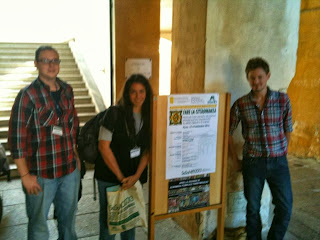To continue our engagement with research
being conducted on citizenship and statelessness in the Middle East and North
Africa (MENA), between the 17th to
19th September, the Statelessness Programme hosted a panel at the Sesamo
conference held at the University of Pavia, to a conference entitled 'Making citizenship. Practices of
exclusion and inclusion, claims and subjectivity in the Middle East and
Europe,'. Sesamo is a society that focuses on the study of
the MENA region based in Italy and they
hold an annual conference on the region.
Together with former visiting scholar, Jason Tucker, we took the
opportunity of this event to discuss our work on the MENA region with other
academics whose work had focused on similar issues.
Our panel was called Statelessness in the Middle East; Contesting the Boundaries of Citizenship. It began with Benjamin Smuin , who is from the University of San Diego, who spoke about his paper entitled Citizens Without States? Claiming Citizenship and Rights under the League of Nations Mandate System. This then followed with a presentation by Thomas Mcgee from the University of Exeter - who we have previously worked with on research related to the Stateless Kurds for our MENA project - who gave his insights into the current situation of the stateless Kurds from Syria and their access to Syrian nationality. In a loose temporal flow the panel ended with a discussion by our MENA researcher, Zahra Albarazi, and Jason Tucker who spoke about their paper entitled Citizenship as a political weapon - a mechanism for exclusion and inclusion in the region. The paper examined how the shifts in the political discourse in the Middle East over the last few years have highlighted the use of citizenship as a political weapon - a mechanism for exclusion and inclusion. We argued that established perceptions of belonging to nation-states are currently being challenged, with the nation-state being re-defined through the contestation of the legal boundaries of citizenship. By focusing on citizenship as the legal link to a country, we explored with the audience the demands for citizenship by hundreds and thousands of stateless people throughout the region - those who are not considered a citizen by any state. The discussion then looked at the recent policies of State manipulation in removing opposition voices from the political arena by both rendering nationals stateless and granting citizenship to stateless people to encourage support for threatened regimes. We looked at the case studies of Bahrain, UAE, Syria and Kuwait to highlight these issues. Why and how this exclusion has been created and how recent political shifts in the region have led to challenging the politicized power over defining citizenship was debated as the stateless provide an enlightening and in this conference unique analytical lens through which to view the concept of citizenship in the region.
Our panel was called Statelessness in the Middle East; Contesting the Boundaries of Citizenship. It began with Benjamin Smuin , who is from the University of San Diego, who spoke about his paper entitled Citizens Without States? Claiming Citizenship and Rights under the League of Nations Mandate System. This then followed with a presentation by Thomas Mcgee from the University of Exeter - who we have previously worked with on research related to the Stateless Kurds for our MENA project - who gave his insights into the current situation of the stateless Kurds from Syria and their access to Syrian nationality. In a loose temporal flow the panel ended with a discussion by our MENA researcher, Zahra Albarazi, and Jason Tucker who spoke about their paper entitled Citizenship as a political weapon - a mechanism for exclusion and inclusion in the region. The paper examined how the shifts in the political discourse in the Middle East over the last few years have highlighted the use of citizenship as a political weapon - a mechanism for exclusion and inclusion. We argued that established perceptions of belonging to nation-states are currently being challenged, with the nation-state being re-defined through the contestation of the legal boundaries of citizenship. By focusing on citizenship as the legal link to a country, we explored with the audience the demands for citizenship by hundreds and thousands of stateless people throughout the region - those who are not considered a citizen by any state. The discussion then looked at the recent policies of State manipulation in removing opposition voices from the political arena by both rendering nationals stateless and granting citizenship to stateless people to encourage support for threatened regimes. We looked at the case studies of Bahrain, UAE, Syria and Kuwait to highlight these issues. Why and how this exclusion has been created and how recent political shifts in the region have led to challenging the politicized power over defining citizenship was debated as the stateless provide an enlightening and in this conference unique analytical lens through which to view the concept of citizenship in the region.
This was a
good opportunity for two people from different fields, law and political
science, to offer an interdisciplinary perspective on these very topical issues
in the MENA region. The conference also provided a great opportunity to hear
about other research on citizenship being conducted in the area as well as to
understand academic developments from a very wide variety of disciplines.



